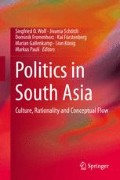Abstract
State legitimacy is to a large extent derived from the ability of a government to overcome social challenges and to contribute to the country’s social welfare and stability. Discussing and evaluating the record of the Indian Republic in meeting challenges and demands within the social sector, this chapter identifies six major challenges that face contemporary India. The six core challenges highlighted are: the so-called ‘demographic dividend’, healthcare, education, the environment and water scarcity, poverty-alleviation and, the attitude towards women. It will furthermore, be illustrated how policies, even when successful, have unintended consequences which can engender new challenges. For example, the Green Revolution enabled India to become self-sufficient in food and at the same time, stimulated a dramatic increase in population. Various policy responses are considered including structural adjustments such as further de-centralisation and the strengthening of the panchayat as the way forward for India.
Access this chapter
Tax calculation will be finalised at checkout
Purchases are for personal use only
Notes
- 1.
Asha means hope and is a popular name for girls.
Bibliography
International Food Policy Research Institute. (2009). Global hunger index. Washington, DC: International Food Policy Research Institute.
Kaviraj, S. (1995). Crisis of the Nation in India. In J. Dunn (Ed.), Contemporary crisis of the Nation State? (pp. 115–129). Oxford: Blackwell.
Mitra, S. K., & Singh, V. B. (1999). Democracy and Social Change in India. A Cross-Sectinal Analysis of the National Electorate. New Delhi: Sage.
Mitra, S. K., & Singh, V. B. (2009). When Rebels become stakeholders. Democracy, agency and social change in India. New Delhi: Sage.
Visaria, L. (2004). The continuing fertility transition. In T. Dyson et al. (Eds.), Twenty-first century India. Population, economy, human development and the environment (p. 69). New Delhi: Oxford University Press.
Witte, J., & Wagner, G. (1995). Declining fertility in East Germany after unification. A demographic response to socioeconomic change. Population and Development Review, 2(21), 387–397.
Author information
Authors and Affiliations
Corresponding author
Editor information
Editors and Affiliations
Rights and permissions
Copyright information
© 2015 Springer International Publishing Switzerland
About this chapter
Cite this chapter
Rothermund, D. (2015). India’s Social Challenges. In: Wolf, S., et al. Politics in South Asia. Springer, Cham. https://doi.org/10.1007/978-3-319-09087-0_4
Download citation
DOI: https://doi.org/10.1007/978-3-319-09087-0_4
Published:
Publisher Name: Springer, Cham
Print ISBN: 978-3-319-09086-3
Online ISBN: 978-3-319-09087-0
eBook Packages: Humanities, Social Sciences and LawPolitical Science and International Studies (R0)

